|
The ojbectives for this course are several and come in two broad categories. First, substantive objectives: the principal goal of this course is to familiarize students with the principal events surrounding the rise, evolution, and eventual collapse of the National Socialist regime in Germany, 1933-1945. That is a vast topic and encompasses every dimension of social, political, economic, religious, cultural, and moral life in Germany and, most of Europe, for the years of Nazi rule. To make this sprawling topic more manageable and to give it some analytic focus, the course adopts the perspective of social history and the experience of everyday life: it asks students to consider how the dramatic transformations brought about by the National Socialist “seizure of power” in 1933, as the Nazis liked to call it, affected the many populations that made up German society — women, adult men, children and adolescents; religious groups, Protestant, Catholic, and non-Christian; socioeconomic groups, such as workers, artisans, businesspeople, civil servants and professionals; “Aryans” and foes of the “racial community,” Jews in the first instance, but also Roma, gay men, and political opponents of the regime. A common question runs through all of these topics: what was the scope of individual agency in the Third Reich? In seeking answers to this question, students will explore the relationship between individual German citizens and the emerging police state, specifically whether and to what extent the secret police — the “Gestapo”— were dependent on the voluntary complicity of ordinary Germans. Students will also examine whether and to what extent ordinary Germans believed in, or were persuaded by, the propaganda that flooded their senses through the years after 1933; they will ask whether, and to what extent, the Third Reich delivered on its promises to ordinary Germans and how the perception of success and/or failure affected the Nazi regime's legitimacy. Several weeks will focus the experiences of particular social groups: week four, for example, will probe the experiences of young people in Nazi Germany, week five will explore the experienes of women, week six will delve into the experiences of German Jews during the 1930s, week seven the experiences of gay men, and week eight the experiences of soldiers at the front. Throughout, students will grapple with scholarly debates on each of these topics, delivered (for the most part) in the form of academic articles. This will aid students in acquiring an important analytical skill, namely the ability to grasp and understand a historical argument and its relationship both to primary sources and the scholarly debates with which an argument engages. The main writing assignment for this course reinforces this objective: students will write an analytical essay on a single, scholarly book, using as many scholarly reviews of that book to develop their own ideas about its strengths, weaknesses, and importance. |
A signification portion of each week's session will be devoted to a group discussion of books and/or other readings that students will have prepared in advance of class. Expect to read a book each week, or its rough equivalent in articles or primary documents. In this course we will be discussing the following books:
William Sheridan Allen, The Nazi Seizure of Power: The Experience of a Single German Town, 1922-1945, revised edition (Brattleboro: Echo Point Books, 2014).
Marion A. Kaplan, Between Dignity and Despair: Jewish life in Nazi Germany
(New York: Oxford University Press, 1998).
Omer Bartov, Hitler's Army: Soldiers, Nazis, and War in the Third Reich (Oxford: Oxford University Press, 1993).
Christopher Browning, Ordinary Men: Reserve Police Battalion 101 and the
Final Solution in Poland, 2d ed. (New York : HarperPerennial, 1998).
For general background, there will be weekly assignments from Martin Kitchen, The Third Reich: Charisma and Community (Pierson-Longman, 2008). All of these readings are available for purchase at the University Bookstore. With Allen's Nazi Seizure of Power and Browning's Ordinary Men, make sure you obtain the revised edition. If your resources are limited, have no fear: copies of all these books will be held for you on four-hour reserve in Knight Library.
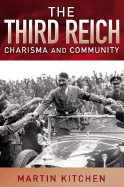
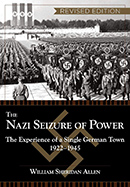
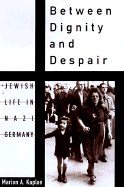
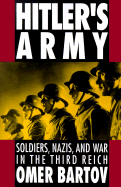
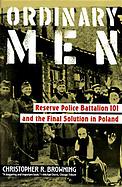
This course operates as a seminar, which means that in addition to lectures there will be a heavy emphasis placed on reading and discussion. Everyone should plan on reading a book (or its rough equivalent in pages) each week during the ten week term. A large portion of each meeting will be devoted to discussing these readings, so it is incumbent on everyone to attend prepared to share ideas and debate them. To facilitate this, I'll be posting study questions each week. Needless to say, it is imperative that you attend each session: every absence amounts to 10% of the course, and no student with a 10% truancy rate hope to get an A.
In addition to attendance and participation, the requirements are as follows:
1) Examinations:
a) There will be a take-home mid-term examination
b) There will be a quizzes on the readings throughout the term.
2) Written Work:
The second assignment is a paper, at least 2,000 words in length, which will be due in class at our
last meeting in Week 10. All papers must be submitted electronically to Vericite and printed out for delivery in class. For this assignment, you can choose between two options:
Option 1: Book Review
For the first option, you can review a book that analyzes some aspect of the
history of Nazi Germany. You can choose a book from the course
bibliography, or you can pick a book on your own. If you choose a book
of your own, however, you must obtain your professor's approval. This is simply
because so much garbage gets published about the Third Reich — starting with
Holocaust-denial literature — and no one expects you to be able to distinguish
the junk from the legitimate stuff. Generally speaking, anything published
by a university press is a safe bet: all such books undergo a thorough vetting
process, and usually you can rely on its integrity. Whether you pick a book
from the bibliography or choose your own book to review, you are required
to locate and consult at least two scholarly reviews of the book you choose,
and to weigh the criticisms they contain in your own analysis.
Note that this is a bare minimum requirement; any student striving to do excellent work for an excellent grade should seek out every scholarly review available. Note also that while many reviews will be available on-line, many more will not be available through the internet. Obtaining them will typically require a research trip to the Library.
Option 2: Memoir Review
The second option is to read a memoir of the this period and write an analysis of it. Here too, you are required to consult at least two scholarly reviews
of the memoir. In addition, you are expected to connect the memoir's themes
to some major topic in the course and show how the memoir enriches or alters
that theme and the way historians analyze it. The choice of memoirs is yours
to make, but before you start writing your review, make sure that it is not
fraudulent -- over the years since 1945, many a memoir has been exposed as
pure or partial fabrication. If you choose the memoir review option, you must also take pains to consult any and all scholarly books and articles that have made use of your memoir and assess the methods they have employed to analyze the memoir as a historical source.
Academic Honesty:
A note on academic honesty, plagiarism, repurposing, fabrication, and cheating: the policy for this course is simple. Anyone who cheats on an exam or who turns in work for credit that is repurposed or plagiarized or that is not substantially his/her own will receive an “F” for the assignment, and because each assignment is a minimum requirement for the entire course, a failing grade on the written assignment will result in a failing grade for the entire course. Students suspected of plagiarism or cheating will also be reported to the Office of Student Conduct and Community Standards, the university agency responsible for adjudicating cases of academic dishonesty. The ultimate penalty for plagiarism is expulsion from the university. If you have any doubt about the meaning of academic dishonesty, please refer to these standard definitions. You can also find useful information on avoiding academic dishonesty at the University Library.
As a safeguard against academic dishonesty, all written work must be submitted in two forms: (i) a paper print-out, in order to make facilitate grading; and (ii) electronically, by depositing your work in SafeAssign on Canvas.
If you are in any doubt about the what constitutes of academic dishonesty, consult the definitions employed in the Student Code of Conduct. For the consequences of academic dishonesty, refer to the sanctions enumerated in the Student Code of Conduct. Violations will be taken seriously and are noted
on student disciplinary records. In severe cases, violations of the Student Code of Conduct may result in the student's suspension or the revocation of her/his degree.
Grading:
The breakdown for grading is as follows:
Attendance & Classroom Discussion 25%
Mid-Term Examination 30%
Quizzes 15%
Written Work 30%
If you have a documented disability and anticipate needing accommodations in this course, please make arrangements with me soon. Also, please ask the Counselor for Students with Disabilities to send me a letter verifying your disability at the following address:
David M. Luebke
1288 Department of History
University of Oregon
Eugene OR 97403-1288
Image: “We Arm Ourselves, Body and Soul,” a poster for the Reich Labor Service (Reichsarbeitsdienst). The Labor Service was established by a decree of 26 June 1935 and required six months' labor service of males between the ages of nineteen and twenty-five. Later, labor service was introduced for young women as well, an experience Melita Maschmann recounts in her autobiographical text, Account Rendered. Image source: German Propaganda Archive at Calvin College.
.jpg)